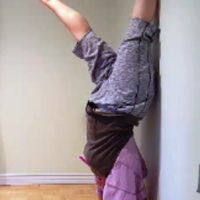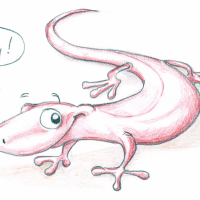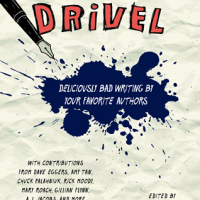 Hello from the Dogpatch, and welcome to the dogfight! Based on a childhood experience, Laurel Leigh wrote an early version of this story as a pre-MFA student taking creative writing classes at U.C. Berkeley Extension in 1999. That first version was one of few student stories selected for an SF Bay Area reading night. Being the type of writer who can let stories sit for a very long while, it’s been through numerous revisions over the years and the plot now continues where the actual events ended. A previous version titled “The Raffle” was selected for both the Squaw Valley Writers Workshop and Tin House Writers Workshops. Laurel plans to include this story in her collection in process, Gracie and Them, and meanwhile may submit it separately.
Hello from the Dogpatch, and welcome to the dogfight! Based on a childhood experience, Laurel Leigh wrote an early version of this story as a pre-MFA student taking creative writing classes at U.C. Berkeley Extension in 1999. That first version was one of few student stories selected for an SF Bay Area reading night. Being the type of writer who can let stories sit for a very long while, it’s been through numerous revisions over the years and the plot now continues where the actual events ended. A previous version titled “The Raffle” was selected for both the Squaw Valley Writers Workshop and Tin House Writers Workshops. Laurel plans to include this story in her collection in process, Gracie and Them, and meanwhile may submit it separately.
The photo above is of the rumbling north-flowing Red River, seen where it divides Moorhead MN and Fargo ND, a key location in the story now called “Dearest.” This newest title was suggested by Wes during our meeting, and we think it will remain the title. Dogpatch Writers Collective occasionally posts these excerpts of our group critiques of work in progress, and we’d love to know what you think about the excerpt or what we had to say about it. (photo credit: The Red River: Fargo-Moorhead Convention and Visitors Bureau)
Excerpt from “Dearest” (formerly “The Raffle”)
When I’m even with Snee’s front door he walks out of it. I stare at him and forget to pedal. Maybe it’s a rock or that old pothole again, but something bounces into my worn-out chain and it snaps. I go over the handlebars in a kind of somersault, shut my eyes, bounce into the street. When I look again, Snee is staring down at me. He’s the blondest man I’ve ever seen. When he reaches toward me his thin wrist sticks out from his striped shirt. I’ve only seen cufflinks in the Sears-Roebuck catalog, never anyone wearing them. The ones on Snee’s shirt look like clock faces. I’m wishing so hard I’d talked my daddy into letting me keep a dog and that dog was biting Snee on the leg. Then he’s so close, his hand on my shoulder, and I know he’s going to kill me and I should pray. The only prayer I can think of isn’t a prayer. It’s the recipe for butternut pie. From Jilanne:
From Jilanne:
Well Laurel, You’ve got yourself quite a lovely, devastating story here! It has evolved so much since the group first read it. I love how you’ve eliminated an unnecessary character and dialogue, both distractions from the critical components of the story. The result is a much more concentrated or condensed, however you want to view it, version, one that’s driven by voice and tension. The voice of the little girl reminds me of the young female narrator in Ellen Foster, a slim novel written by Kaye Gibbons, a southern writer. She’s both funny and heartbreaking.
I have three suggestions for WWMIBFM (what would make it better for me).
1) I need just one more brush stroke to anchor me in time. I want to know how much time is passing between the loss of the money and the festival, and the confrontation with Snee and his being “dealt with” by the town. Otherwise, I find myself distracted from the story by having to guess.
2) I also need a little more processing of the girl’s loss both internally (keeping it in character for this tough, scrappy little girl) and externally. I want to see her desperation at having to let go of her dream to see her mother’s grave. If you extend the scene where she loses the money from the raffle just enough to give us the modulated internal emotion mixed with the desperate external chase, I think you’d have my heart in a vise. I understand that her world view and age limit how much she can process internally, but I think there are ways to let it leak through a little more.
3) I’d like to know why Snee is in this town, and does it have anything to do with the man he loved and lost? I don’t think it would take much more than another brush stroke to get it in. Right now, it seems like he hasn’t been a longtime member of the community, and I’d like to understand why someone so “different” and older wouldn’t have moved away.
I love your ending. The little girl, now older, achieves this gorgeous state of grace. It’s really well done. Thanks for giving the Patch a chance to read and critique this story!
Jilanne
 Guest critique from Yael Schonfeld Abel: First thing I have to note is your really fine touch with voice, especially young people’s voices; there very well might be a YA book in your future somewhere… As in “Shoeless,” there are just so many lines that sound just right and work beautifully, from something small like “cash money” on p. 1, to the line about Mary Lee running out of relatives and coming poaching, the exchange with Danny on 2, the customers “smiling out the door with slices of pie in their hand” (6), the pie recipe as a prayer during the encounter with Snee, and thanking him “both for the band aid and for not killing me…” (8).
Guest critique from Yael Schonfeld Abel: First thing I have to note is your really fine touch with voice, especially young people’s voices; there very well might be a YA book in your future somewhere… As in “Shoeless,” there are just so many lines that sound just right and work beautifully, from something small like “cash money” on p. 1, to the line about Mary Lee running out of relatives and coming poaching, the exchange with Danny on 2, the customers “smiling out the door with slices of pie in their hand” (6), the pie recipe as a prayer during the encounter with Snee, and thanking him “both for the band aid and for not killing me…” (8).
The ending: I can understand your concerns about it being too sugary. I think part of it is the fact that as literary fiction writers, we’re almost conditioned to believe that there’s something not completely legit about giving our protagonists what amounts to a happy ending; or if we do, that they really have to earn it – which your heroine does. There’s also a difficulty with the expectations you’ve built up about Snee. Anyone who has some experience with plot twists is almost expecting those expectations to be subverted – in other words, for Snee to be a basically decent guy. But the other option, having him fulfill everyone’s worst expectations, is not terribly satisfying, either, and I think your previous version affirms this: a world in which Danny Agenbroad is the ultimate judge of character won’t necessarily be a world in which we want to spend a lot of time…
I think what ultimately makes this version work is the way our expectations of Bad Touch are subverted not just into No Touch but into Good Touch, in a way that is powerful and authentic – I could absolutely see how this girl would be seeking maternal warmth and touch where she could find it, and how, happily, in this case, this guy could provide it in a positive way. I also love the way you conveyed the results of the raffle without dwelling on it too much – the foray into the future worked for me. If you are still worried about over-sweetness, one possible solution to experiment with is to have a longer scene in the present after she leaves Snee’s house; it could be an encounter with any or several of the kids – Danny, even Mary Lee – that reinforces the idea that there’s still a ways to go before the optimistic future we glimpse in Bismarck. And if you do go for such a scene, I might save the detail about Billy’s dogs dying in the book for that. I do like all the elements of your final scene – Bismarck, the flashback, and the ending line, and I’d keep all of them.
With thanks to our guest reader: A writer, editor, and Hebrew translator, Yael’s marvelous writing has appeared in publications including Playboy, The San Francisco Bay Guardian, Literal Latte, and The Mid American Review. See more about her at http://hebrewtranslations.org/.
 Wes sez: This is a very different story from an earlier version I remember seeing. Snee is a much less sinister character, and there is less discussion of the arcane mechanics of the raffle your protagonist is so bent on winning. That being said, I think you have a much better story this time around.
Wes sez: This is a very different story from an earlier version I remember seeing. Snee is a much less sinister character, and there is less discussion of the arcane mechanics of the raffle your protagonist is so bent on winning. That being said, I think you have a much better story this time around.
It is the voice that makes this story for me. You have mastered the voice of this particular character, the slightly flat affect of the bright, small-town girl who knows all of the ins-and-outs of her tiny, circumscribed world. It is in those moments when your protagonist’s slightly know-it-all attitude falls away, when she is confronted by elements of the adult world that are beyond her understanding, that your story takes flight for me.
This is a sad, isolated, motherless little girl who, even though she’s in the fourth grade, still sucks her thumb and whose streetwise demeanor hides the sadness underneath her spunk and grit. It is this spunk and grit, and her wiry determination, that make her memorable, and make her story worth telling; but it is this very same spunk and grit that also make her story heart-breaking.
I think you made the right move, toning down the sinister nature of the Snee character. But I also think that adding a little more build-up to the fateful confrontation with Snee might help your story, perhaps a little more background about the reaction to his arrival in town. We hear what the kids in town have to think about him, but it might help to know what the adults think, too. An exotic hothouse flower like Snee is going to provoke some kind of talk in a small town.
Danny Agenbroad–great character name, by the way–does a good job telegraphing to the reader what the local kids think of the new guy; and I get a very real sense of your protagonist’s fear of getting caught alone with him. It’s obvious people have been talking about the bachelor gentleman who’s recently moved into town. But it might help to have your hero debate with herself over whether all the stories could really be true. Or have her consider what her father or one of the adult neighbors said about the man.
***
The loss of the raffle money presents the biggest problem for me as a reader. It is here that your story’s greatest strength—the laconic voice and heartbreakingly flat affect of the protagonist—undercuts the pivotal scene in the story. ‘I somehow let go of the raffle money envelope…’ does not really work for me. The use of the word ‘somehow’ seems lazy to me here.
I think you might delve a little deeper into your protagonist’s thought process here, show her distracted by her own thoughts a little more, so that when she sees the bills flying around, it takes a moment for the enormity of the situation to dawn on her.
The confrontation with Snee is a similarly momentous occasion, and you handle that situation just as it should be. Your hero is riding along on her bike, thinking this and that, when her bike tire hits something, her chain snaps, she feels herself going over the handlebars and bounce into the street…and the next thing she knows Snee is staring down at her.
This is the way the world seems to rush at us sometimes. How things can jump us when we’re not paying attention, or when our attention slips for just that one crucial moment—particularly when we’re kids.
The jarring nature of the situation—coming face-to-face for the first time with Snee, and when she is at her most vulnerable—is communicated successfully to the reader from the protagonist’s jaggedly interrupted perspective.
I think you need to bring something of this to the pivotal moment when the raffle money is lost. This is the moment that sets all the other moments of the story into motion, and I don’t think you want to undercut it the way you do.
Glad to hear you think my suggestion to change the title is a good one.
When the story was more focused on the mechanics of the raffle, I think your previous title fit well; but now that the story is more about the misunderstandings that exist between people because they don’t take the time to get to know each other better, I did feel that a title change was in order.
Great job!
~ BEST WISHES FOR 2014 FROM ALL OF US AT THE DOGPATCH ~

















Pingback: Coen-Esque, You Betcha! | Dogpatch Writers Collective
Thanks for letting us drop in on the critique, Laurel et al. Though the excerpt was the tip of the iceberg in terms of a reader understanding “Dearest,” the voice was powerful and hooked me right away. I want to read the story! The critique proper made me feel rather like a literary voyeur needing a cold shower.
Thanks for that comment, Susan! I appreciate knowing the voice is starting to work. That story has been through so many revisions over the years that I keep looking track of the narrative style. I just looked at the very first draft I wrote in 2000 and felt like I lost something along the way that I need to regain.
See you soon, I hope! Laurel
Thanks for the good words, Jill. I was so encouraged by this discussion of the story. I’ve reworked it so many times that I was losing my perspective on the character, and it was hugely helpful to get your take. And ha ha, this one definitely isn’t going over the transom until I finish putting in your edits!
Laurel, just re-reading our discussion (and getting Yael’s take on the story) makes me appreciate “Dearest” even more. Great work! And is it selfish to say that I’m glad your story wasn’t accepted for publication before we had the chance to discuss it this time? 😀